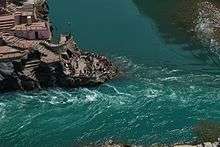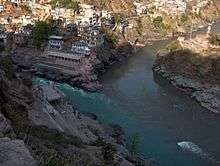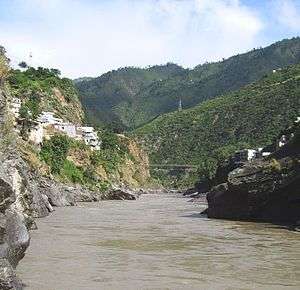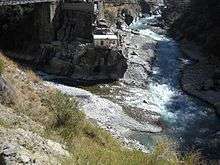Devprayag

| Devprayag | |
|---|---|
|
| |
 Devprayag Location in Uttarakhand, India | |
| Geography | |
| Coordinates | 30°08′47″N 78°35′54″E / 30.146315°N 78.598251°ECoordinates: 30°08′47″N 78°35′54″E / 30.146315°N 78.598251°E |
| Country | India |
| State | Uttarakhand |
| District | Tehri Garhwal |
| Locale | Uttarakhand, India |
Devprayag (Devanagari: देव प्रयाग Deva prayāga) is a town and a nagar panchayat (municipality) in Tehri Garhwal district[1][2] in the state of Uttarakhand, India, and is one of the Panch Prayag (five confluences) of Alaknanda River where Alaknanda and Bhagirathi rivers meet and take the name Ganga or Ganges River.
Overview
Traditionally, it is considered to be the place where sage Devasharma led his ascetic life, giving birth its present name, Devprayag. It is one of the five sacred confluences in the hills and is an important place of pilgrimage for devout Hindus.[3]
"Devaprayāga" means "Godly Confluence" in Sanskrit. As per Hindu scriptures, Devaprayaga is the sacred event of merging two heavenly rivers, Alakananda and Bhagirathi, to form the holy Ganges.
On a terrace in the upper part of the village is the temple of Raghunathji, built of huge stones, pyramidal in form and capped by a white cupola.[4]
Devprayag is the home of the late Acharya, Pt. Chakradhar Joshi (a scholar in Astronomy and Astrology) who established Nakshatra Vedh Shala (an observatory) in the year 1946. This is located on a mountain called Dashrathanchal at Devprayag. The observatory is well equipped with two telescopes and many books to support research in astronomy. It also contains about 3000 manuscripts from 1677 AD onwards collected from various parts of country. Apart from the latest equipment, it also has the ancient equipment like Surya Ghati,Dhruv Ghati which showcase the pride of Bharatiya progress in the field of astronomy. Shri Dr. Prabhakar Joshi and Acharya Shri Bhaskar Joshi (Popularly known as Guruji) are currently in charge and caretakers of the observatory.
Devprayag has much natural beauty. Other than Sangam and Raghunath Ji Temple in Devprayag, one can visit sacred places like Mata Bhuvneshwari temple at nearby village Pundal followed by Dhaneshwar Mahadev temple, Danda Naggaraja (Lord of Snakes) temple and Chandrabadni temple.
Devprayag is the place where river Alaknanda & Bhagirathi confluence, but according to mythology, there is another river belong to this confluence named Saraswati which originates from Mana Village in Badrinath and in Devprayag, the river comes from the feet of Shri Raghunath Ji in Raghunath Temple. There are also the footprints of Lord Rama exist at "Ram Kunda".
Devprayag is surrounded by 3 Godly peaks, named Giddhanchal Parvat, Dashrathanchal Parvat, and Narsinghancal Parvat. Giddhanchal Parvat is on top of Raghunnath Ji temple. Narsinghanchal Parvat is in front of Giddhanchal Parvat and Dashrathanchal Parvat is on top right side of "Sangam". Lord Shiva is worshiped here in the form of Linga, named Tondeshwar Mahadev and Dhaneshwar Mahadev. Tondeshwar Mahadev is Just in front of Sangam. It is very crowded on the day of Mahashivratri. Many devotees arrives here to donate Gangajal on Linga. Dhaneshwar Mahadev is in route on old Badrinath Way, starts from Bah Bajar (A market in Devprayag). With this way devotees can reach at Just another temple of Maa Durga in Pundal Village. In this temple, Maa Durga is worshiped in Maa Bhuvneshwari form. The temple of Maa Bhuvneshwari is situated at Pundal village which is at footstep of approx 500-700mtrs from Dhaneshwar Temple."Mishras" live here in Pundal village.
Devprayag is divided into three parts. One is Bah Bazzar(Pouri Side part), second one is Beech Bajar (laying down to the Highway No.58)and the third is Shanti Bazar, main bus stand of Devprayag.
Devprayag is the home of priests of Badrinath. They are known as "Pandas". Every Panda has his own region in whole country. A thousand years ago, when Adiguru Shankaracharya came to the area in Badrikashram in the 8th century, many South Indian Brahmins from different areas with different castes came over here with Aadiguru. These were "Tetriya Krishna Yajur Brahmin. Inspired by the wisdom of Brahmins, Maharaja of Garhwal assigned them to worship Lord Ram in Raghunath Temple in Devprayag. When these Brahmins arrived at Badrinath, they were worshiped by the pilgrims. Since then, Brahmins are known as Panda in Dham and everywhere. Pandas worship devotees of the same area of each region they offers. Every Panda plays a significant role in any devotee life while he arrives Badrinath for Puja or Darshan. While they arrive Badrinath, Pandas look after them very carefully. Pandas organize everything for their Yatri like food, accommodation, puja's tickets, and everything which is really needful to the yatri. Pandas have a thousands years of literature of their devotee(Yatri). In this literature, every information is mentioned about devotee's last 3 or 4 generations. Every Panda having various types of books related to his Yatri's information, like Bahi, Daskhati and all others. Every Yatri is identified with the help of these books. The peoples of Devprayag (Pandas) spend their 6 months of a year at Badrinath and rest of 2–3 months in Devprayag. They spend this in their own regions. It is quite hard for a Panda and his family as He spends very less time with the family. Many peoples say that Pandagiri is a very normal and less prestigious occupation. But as it belongs to their God Almighty and this is their patrimonial occupation, it automatically becomes more prestigious rather than the other occupations. The cuisines of Devprayag are also rich and famous as Devprayag. Dishes like Singori and Bal Mithai keep an important place in Devprayagi's heart. Singori, traditionally made with khoya wrapped in form of a cone with Maalu leaves. The khoya absorbs the smell of Maalu leaves. On the other hand, Bal Mithai is a brown chocolate-like fudge, made with roasted khoya, coated with white sugar balls.
Geography
The Alaknanda rises at the confluence and feet of the Satopanth and Bhagirath Kharak glaciers in Uttarakhand near the border with Tibet. The headwaters of the Bhagirathi are formed at Gaumukh, at the foot of the Gangotri glacier and Khatling glaciers in the Garhwal Himalaya. These two sacred rivers join to form the Ganges (Ganga) in Devprayag.
Devprayag is 70 km from Rishikesh. Devprayag has an average elevation of 830 metres (2,723 feet).
Demographics
As of 2001 India census,[5] Devprayag had a population of 2144. Males constitute 52% of the population and females 48%. Devprayag has an average literacy rate of 77%, higher than the national average of 74.5%; male literacy is 82% and, female literacy is 72%. In Devprayag, 13% of the population is under 6 years of age. The town is the seat of the pandas of the Badrinath Dham.
How to reach
Air
The nearest airport is the Jolly Grant Airport near Dehradun 116 km (72 mi) away.
Railway
The nearest railway stations is at Rishikesh. However, Rishikesh is a small railway station not connected by fast trains. Haridwar railway junction, 24 km farther from Rishikesh, has train connections to most of the major cities in India and is, therefore, the railhead for Devprayag.
Road
Devprayag lies on national highway NH58 that connects Delhi with Badrinath and Mana Pass in Uttarakhand near Indo-Tibet border. Therefore, all the buses and vehicles that carry pilgrims from New Delhi to Badrinath via Haridwar and Rishikesh in pilgrim season of summer months pass through Devprayag on the way to Joshimath and further north. Rishikesh is the major starting point for road journey to Devprayag and regular buses operate from Rishikesh bus station to Devprayag. The road distance from Rishikesh to Devprayag is 74 km (46 mi).
- Haridwar to Rishikesh 24 km
- Rishikesh to Devprayag 74 km
- Devprayag to Srinagar 34 km
- Srinagar to Rudraprayag 33 km
Gallery
 The Bhagirathi (left) joins the Alaknanda (right) at Devprayag
The Bhagirathi (left) joins the Alaknanda (right) at Devprayag The sediment-laden Alaknanda river flowing into Devprayag.
The sediment-laden Alaknanda river flowing into Devprayag.- Devprayag the confluence of Bhagirathi and Alaknanda rivers. The river gets the name "Ganges" beyond Devprayag
See also
References
- ↑ Fast facts Devprayag Official website.
- ↑ Map of Pauri Garhwal district Pauri Garhwal District Official website.
- ↑ Devprayag Tehri Garhwal district, Official website.
- ↑
 One or more of the preceding sentences incorporates text from a publication now in the public domain: Chisholm, Hugh, ed. (1911). "Devaprayag". Encyclopædia Britannica. 8 (11th ed.). Cambridge University Press. p. 120.
One or more of the preceding sentences incorporates text from a publication now in the public domain: Chisholm, Hugh, ed. (1911). "Devaprayag". Encyclopædia Britannica. 8 (11th ed.). Cambridge University Press. p. 120. - ↑ "Census of India 2001: Data from the 2001 Census, including cities, villages and towns (Provisional)". Census Commission of India. Archived from the original on 2004-06-16. Retrieved 2008-11-01.
External links
| Wikimedia Commons has media related to Devprayag. |

